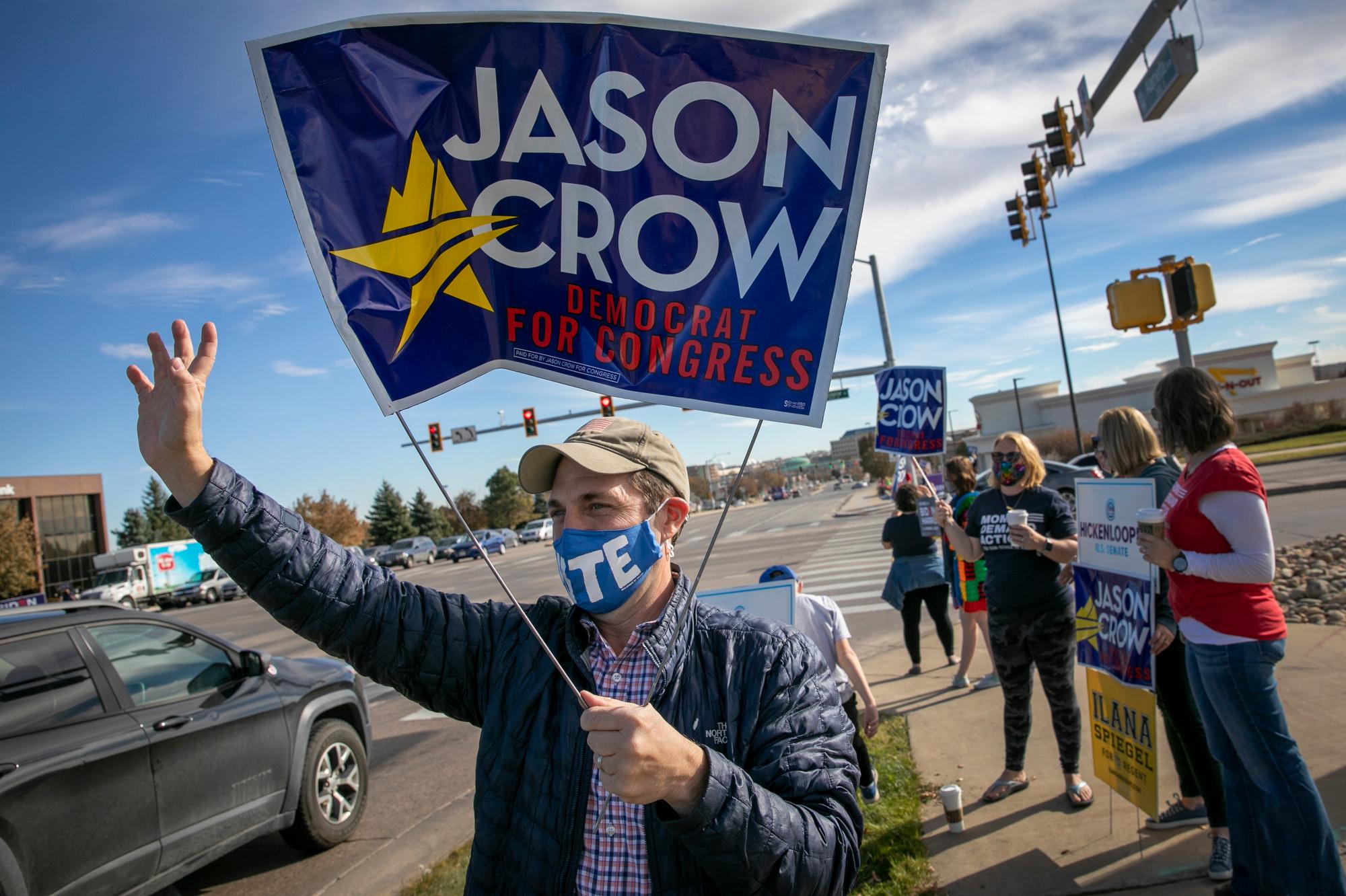
In the inauguration of President Joe Biden, Colorado Rep. Jason Crow found a moment of reflection on the country’s journey over the past few years.
The Democrat from Aurora thought about how his political journey started in response to former President Donald Trump’s ascension to the presidency and how two weeks ago it ended with a riotous mob.
“Then, sitting there on that platform with other members, Republicans and Democrats, to usher in the peaceful transition of power,” Crow told Colorado Matters, describing attending the inauguration. “So it was pretty overwhelming and pretty surreal, but at the same time there was really no time for celebration, because we are a nation in crisis, and we had to get right back to work.”
Right out the gate, Crow said the Biden administration and Congress are addressing the pandemic. Of priority is a robust testing infrastructure and improving the vaccine rollout, especially after it came to light last week that the Trump administration didn't have a stockpile of vaccines as originally promised.
Crow also said he supports more direct payment stimulus, meaning the possibility of a $1,400 in the pockets of Americans, in addition to the $600 Congress approved before the start of the new year. Additionally, he emphasized the importance of giving more money to schools to make sure they’re safe enough to reopen.
“Because it is really hard to open up our businesses and have people go back to work if our kids are still at home,” Crow said. “We have to be able to open up schools first so that we can get our kids back into schools.”
Interview Highlights
On criticism of his colleague, Republican Rep. Lauren Boebert:
“I think we're going to do an investigation to determine the facts of what happened leading up to the Jan. 6 insurrection. I obviously have very deep concerns and I've been pretty honest about that. I think if people have learned something about me, they know that I speak my mind and I don't hold back on issues of values and morality. And I have very deep and grave concerns about Ms. Boebert. That is true. And I do believe that her rhetoric helped incite the insurrection on Jan. 6.
So what we're going to do is we're going to conduct an investigation. And there's already investigations that are going on. There's the GAO investigation. There's going to be House investigations. There are criminal investigations going on by the FBI. And we're going to get the facts because that's the way it works in America. You get the facts, and then you apply those facts to available remedies and we see what's appropriate. So that's the process that we're going to go through.”
Editor's Note: Colorado 3rd Congressional District Rep. Lauren Bobert has denied accusations made by other House representatives that she gave insurrectionists a tour of the U.S. Capitol in advance of the events of Jan. 6.
On his bill to end “dark money” in political campaigns:
“Well, I'm an eternal optimist ... I wouldn't be here in this job if I didn't think we could get big things done. And so long as I think we can, I'm going to continue to push it. And this was the first bill, my End Dark Money Act. This was the first bill I introduced last Congress when I first came to Congress. And it's the first bill I'm introducing this Congress. And here's why. If you want to change the culture of Washington, if you want to actually start getting big things done, you have to clean up the system.
You got to end the influx of this dark money in these super PACs that's so corrosive and toxic to our political system. And that applies to health care, it applies to gun violence, it applies to addressing the climate crisis. You apply it to every major challenge we face. You've got to turn off the spigot of dark money into Washington and into our politics. And that's why I'm going to continue to make this my first bill until we get it done.”
On what he’s hearing from his constituents:
“I talk to folks all the time, and businesses are closing right and left. And I'm not concerned for the big companies, right? The big corporations, the businesses, they're largely doing just fine. I'm really concerned for the mom and pop shops. I sit on the Small Business Committee, and I'm the only member of Congress from Colorado in the Small Business Committee. So I've spent a lot of time the past year trying to get aid to our small businesses. And these are largely businesses of 10 or fewer employees.
These are the bakers on the corner, the seamstresses, the small restaurants, the others who, if they close, that is not just a huge blow to our economy, but it would fundamentally change the character of our community. I mean, because these are the businesses where we spend our lives, our time, where we have our memories of family. So we have to save them, and we have to save them fast. So that's what I'm hearing. And I'm going to work really hard to get them the aid that they need so that when we get out of this pandemic, those businesses are still around to employ folks, create a strong economy, and help us have a vibrant community.”
Read the Transcript
Avery Lill: The US swore in a new president yesterday, but many problems that began in the previous administration remain, including a deadly pandemic, a struggling economy, and a politically fractured public. Democratic Congressman Jason Crow of Aurora joins us today to talk about these issues and how they affect Colorado. Congressman, welcome.
Rep. Jason Crow: Hi, good morning, Avery.
AL: You attended the inauguration of Joe Biden and Kamala Harris yesterday. Describe what you felt in that moment.
JC: Well, it was a moment of great reflection for me. My political journey started about four years ago when Donald Trump was elected, and I decided to jump into public service to help defend our democracy. Then you fast forward to just two weeks ago, sitting at the very same place where a riotous mob was attacking me and other members of Congress, and trying to derail our democracy. And then, sitting there on that platform with other members, Republicans, and Democrats, to usher in a peaceful transition of power. So it was pretty overwhelming and pretty surreal, but at the same time, there was really no time for celebration, because we are a nation in crisis and we had to get right back to work.
AL: And you mention the stark contrast between the inauguration and the Capitol riots just weeks earlier. Are there still any major security concerns after those riots, given that nothing major has happened during the inauguration?
JC: Yeah, fortunately, it was a very smooth and peaceful inauguration yesterday, but security concerns remain. I mean, the fact of the matter is Donald Trump has radicalized some of his fringe supporters. We have these self-styled militia groups and anti-government groups and conspiracy theorists who deeply believed these lies that they had been told, and they've been radicalized. And I think we have to take that very seriously and make sure that we are working with our law enforcement agencies and others to address any threats. And I think that's something that we're going to have to address in not just the months but the years ahead.
AL: You voted last week to impeach former President Trump a second time. Now that he is officially out of office, is a Senate conviction going to make a difference?
JC: Well, I think it always makes a difference to stand up for our democracy and the rule of law. I've long said that the time is always right to do those things. We can't have an attack on, not just the Capitol building and members of Congress, but truly an attack on our democracy. I mean, what that mob was trying to do was stop the certification of the election. And that mop was incited by Donald Trump and it can't go without some accountability and consequence. I think that would be sending exactly the wrong message to, not just the American people, but autocrats and dictators and despots around the world to let that go unchecked. So we have to do what we have to do. And at the same time, we're going to make our top priority addressing the pandemic, and the economic crisis, and the climate crisis, and the racial justice movement that we have to continue to push forward because we no longer have the luxury of picking one or two things. We have to do it all and we have to do it all well.
AL: And you say this can't go without consequence. Specifically, what is the consequences if Trump is already out of office?
JC: Well, I think one of the obvious ones is obviously sending a very strong message about accountability by convicting him, but also prohibiting him from holding federal office. I mean, he is a danger to our domestic security, to our national security, to the wellbeing and welfare of the American people. And I don't believe he should be allowed to hold elected office. He has proven that time and time again in his presidency, but never more so than on January 6th, when he incited a violent insurrection against our government.
AL: And to be clear, we should say that if the Senate convicts then the Senate can hold another vote to ensure that he doesn't hold federal office again. Last week, during the impeachment vote, he tweeted that some of your... Rather, you tweeted that some of your Republican colleagues in the House were afraid to vote yes because they were receiving death threats. What does this say about the state of political divisions in our country?
JC: Yeah. Our political divisions are deep. They're very deep, and they're very real, and we have to address that. I mean, as I've long said, that is the leadership challenge of the moment is: how do we overcome those divisions so that we can bring people together and actually get things done and meet the crises that we face?
JC: And my Republican colleagues, I had a lot of discussions with many of them, many of whom have become friends and I've done a lot of important work with here in Washington the last couple of years, and had a lot of very personal heart to hearts with them in the lead up to the impeachment vote. And that's what they conveyed to me. A lot of them felt scared for their physical safety. And my response to them, not to be unsympathetic, was, "Welcome to the club. That's the way many of us have felt for a very long time. And we've also been warning you. We've been telling you that this is what's going to happen." And this was the ultimate culmination of Donald Trump's presidency. And many of them actually agreed with that. They said, "Yeah, you have been saying that. And we didn't think it would get this bad."
JC: So that's the price of leadership. Leadership is not easy. It's hard. It comes at a personal sacrifice and it comes at risk if you're doing it right and if you have your motivations in the right place. And people have to do what's in the best interest of the country, not their own political interest.
AL: It sounds like you may be saying that you see a new sense of bipartisanship at the Capitol. Do you sense new unity under the new administration?
JC: Well, I think it's too early to tell. I certainly am resolved to do so because that's the only way that we're going to move our country forward and address these crises. I mean, President Biden said that yesterday because he knows that. You just think about the tone and the tenor and the words that he spoke. He understands, as many of us do, that the only way that we're going to address these crises is if we can find a way to come together. No one party, no one group of people is going to do it on their own. And we have to figure out a way to unify.
JC: And I thought yesterday was a good opportunity for us to hit the reset button. To say, "Okay. Let's all take a step back. Let's lower the temperature in the room, and let's figure this out." So I do believe we have that opportunity. And I think it's going to be done member to member, neighbor to neighbor, person to person. I have long spoke about the need for beer diplomacy. We're not going to solve this in large discussions or in groups. You solve it person-to-person sitting down and figuring out how you can do something with somebody.
AL: You have publicly criticized your colleague Lauren Boebert, who represents Colorado's 3rd Congressional District, for what you called her dangerous rhetoric, and even called her a fool to other media outlets. Do you think that she should resign?
JC: I think we're going to do an investigation to determine the facts of what happened leading up to the January 6 insurrection. I obviously have very deep concerns, and I've been pretty honest about that. I think if people have learned something about me, they know that I speak my mind and I don't hold back on issues of values and morality. And I have very deep and grave concerns about Ms. Boebert. That is true. And I do believe that her rhetoric helped incite the insurrection on January 6. So what we're going to do is we're going to conduct an investigation. And there's already investigations that are going on. There's the GAO investigation. There's going to be House investigations. There are criminal investigations going on by the FBI. And we're going to get the facts because that's the way it works in America. You get the facts, and then you apply those facts to available remedies and we see what's appropriate. So that's the process that we're going to go through.
AL: The first bill you introduced when you were elected two years ago would eliminate political donations made by nonprofit organizations that do not have to disclose their donors. You introduced it again this session. What are the chances of it passing this time around?
JC: Well, I'm an eternal optimist, Avery. I wouldn't be here in this job if I didn't think we could get big things done. And so long as I think we can, I'm going to continue to push it. And this was the first bill, my End Dark Money Act. This was the first bill I introduced last Congress when I first came to Congress. And it's the first bill I'm introducing this Congress. And here's why. If you want to change the culture of Washington, if you want to actually start getting big things done, you have to clean up the system. You got to end the influx of this dark money in these super packs that's so corrosive and toxic to our political system. And that applies to healthcare, it applies to gun violence, it applies to addressing the climate crisis. You apply it to every major challenge we face. You've got to turn off the spigot of dark money into Washington and into our politics. And that's why I'm going to continue to make this my first bill until we get it done.
AL: And President Biden has made it clear tackling the pandemic is his first priority. And he wants to tackle pandemic relief immediately. What have you seen in the President's proposed package that you think would most immediately benefit Colorado?
JC: Well, testing and vaccination distribution. I mean, by every measure, vaccination distribution and the conduct of vaccinations has not gone well. It just hasn't. We are way behind where we need to be right now. And it's a tragedy, like so many other tragedies of the last couple of years. So we have to fix that and we have to fix it quickly. And the things that the Biden administration are doing, things like opening up more testing centers, having a massive influx of healthcare professionals, opening up the eligibility criteria for vaccinations, vastly increasing our testing capacity, and invoking the Defense Production Act, which, by the way, we should have done 11 months ago when we knew this crisis was coming. All of those things are things that are going to make a big difference.
JC: But we also have to be honest too. And Joe Biden is a very honest man. And he said this is going to get harder before it gets better. And that's the truth. That's what the healthcare professionals and scientists and others are telling us, that the trajectory is not favorable for us. It's going to get harder before it gets better. But we are making the changes right now to get us to where we need to be in the months ahead.
AL: And I want to talk a little bit about the stimulus package. Would you support the possibility of more direct payment stimulus money?
JC: Yes, I would. I mean, here's the bottom line. The things that I just talked about regarding vaccination and testing and addressing the health crisis, that's going to take some time because it was deferred for so long. I mean, the things that we started to do at noon yesterday, with the signing of executive orders when President Biden took office, should have been done in March and April of last year. But they weren't. So now we have to do them, and they're going to take some time to take an effect. Our businesses, our families can't wait.
JC: We have to make sure we're extending eviction moratorium, that we're getting more money for small businesses. One of the other things that the Biden plan does is it allocates a substantial amount of money to schools. So we can actually retrofit and get schools to a safe place, get the infrastructure put in place so we can open up our schools. Because it is really hard to open up our businesses and have people go back to work if our kids are still at home. We have to be able to open up schools first so that we can get our kids back into schools. And that's where their health and benefit and mental health as well. And then we can open up the economy. So these things are all tied to one another, and the plan that the President rolled out recognizes that.
AL: Another issue. Last week, the outgoing Trump administration announced that Space Command headquarters would move from Colorado to Huntsville, Alabama. As a member of the Armed Services Committee, is there anything you could do to reverse the decision?
JC: Yeah. I'm working with Senator Bennet, Senator Hickenlooper, Doug Lamborn, and community leaders, and others. And we are going to be pushing back on that decision. We have some very deep concerns about the politics that played into that decision, and we're going to follow up. We're obviously going to advocate for Colorado whenever we have the opportunity to. But even more so than that, we can't have national security and defense decisions being made based on politics. That sets a terrible precedent. It's bad for our national security. It's bad for our troops. So we're going to do what's necessary to shine a light on this process.
JC: I actually had a personal discussion with Lloyd Austin, who's the nominee for Secretary of Defense, which I hope he will be confirmed in the next 24 hours. And I actually raised this issue with him and he told me that he would be looking into it, and they would take a hard look at the process, and restart it if that's what the facts show. So we are working hard to make sure that this is done right.
AL: What are you hearing from your constituents about what they need specifically?
JC: Well, they need us to have leadership to get through the pandemic and to have economic aid and business aid. I talk to folks all the time, and businesses are closing right and left. And I'm not concerned for the big companies, right? The big corporations, the businesses, they're largely doing just fine. I'm really concerned for the mom and pop shops. I sit on the Small Business Committee, and I'm the only member of Congress from Colorado in the Small Business Committee. So I've spent a lot of time the past year trying to get aid to our small businesses.
JC: And these are largely businesses of 10 or fewer employees. These are the bakers on the corner, the seamstresses, the small restaurants, the others who, if they close, that is not just a huge blow to our economy, but it would fundamentally change the character of our community. I mean, because these are the businesses where we spend our lives, our time, where we have our memories of family. So we have to save them, and we have to save them fast. So that's what I'm hearing. And I'm going to work really hard to get them the aid that they need so that when we get out of this pandemic, those businesses are still around to employ folks, create a strong economy, and help us have a vibrant community.
AL: Congressman, thank you so much for your time.
JC: Yeah. Thank you.
AL: Congressman Jason Crow represents Aurora and parts of Adams and Douglas Counties.








